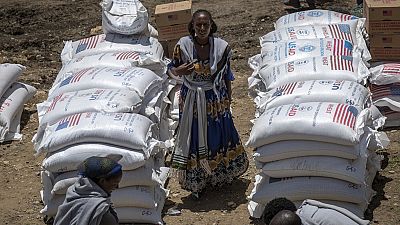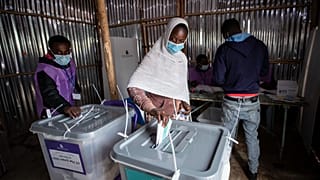Ethiopia
Hunger has killed at least 700 people in Ethiopia's northern Tigray region in recent weeks after the United States and the United Nations paused food aid, local officials and researchers say.
The U.N. and the U.S. first suspended food aid to Tigray in March after the discovery of a scheme to steal donated wheat intended for needy people. They extended the pause to the rest of Ethiopia in early June, affecting 20 million people in need, or about one-sixth of the country's population.
Tigray's Disaster Risk Management Commission has recorded 728 hunger-related deaths in three of the region's seven zones since the food aid was suspended in March. The data is based on information gathered by district officials, said the commission leader, Gebrehiwot Gebregziaher.
"The situation in Tigray is very difficult. Many people are dying because of the food shortage," Gebrehiwot said.
The figure includes 350 hunger deaths in the northwest zone of Tigray, which hosts thousands of people displaced by a two-year conflict in the region that ended in November. In mid-March, U.S. aid officials found enough food aid for 134,000 people for sale in a local market in Shire, the zone's biggest town.
Separately, researchers at Mekele University in the regional capital have documented 165 hunger deaths in seven camps for internally displaced people in Tigray since the food aid suspension began. There are over 100 such camps across the region.
The deaths were reported by camp coordinators to the researchers, who are studying people displaced by the recent war. Most of the deaths are of children, old people and people with underlying health conditions, said one researcher, who spoke on condition of anonymity for fear of reprisals. He linked the deaths directly to the aid suspension.
A U.N. update published on June 14 said the number of children admitted to hospitals in Tigray for malnutrition rose by 196% between April 2022 and April 2023.
The recent war left 5.4 million out of 6 million people in Tigray reliant on food aid. During the conflict, both sides looted humanitarian supplies and the government restricted aid access, leading U.N. investigators to accuse it of "using starvation as a method of warfare." A ceasefire signed in November had allowed aid deliveries to resume to the region.
Aid workers have told The Associated Press, which first reported the food aid theft, that senior Ethiopian government officials were deeply involved. The U.S. is refusing to reinstate food aid until they are removed from the aid distribution process and stronger checks are introduced.
Ethiopia's government dismisses as harmful "propaganda" the suggestion that it bears primary responsibility for the disappearance of aid in Tigray and other regions, but it has agreed to a joint investigation with the U.S. while the U.N.'s World Food Program carries out a separate probe.
Although they have suspended deliveries of food, the U.S. and WFP continue to run nutrition programs for women and children. However, these have been hampered by a lack of funding.












00:24
South Sudan families battle rising Nile floods to survive
01:35
Haitians try to rebuild lives in aftermath of Hurricane Melissa
01:48
United States: Vermont school district receives threats after putting up Somali flag
00:30
Global humanitarian crisis worsens, UN seeks $23 Billion for 2026
00:55
Rwanda signs $228 agreement with US under Washington's new aid model
01:00
Pix of the Day: December 5, 2025